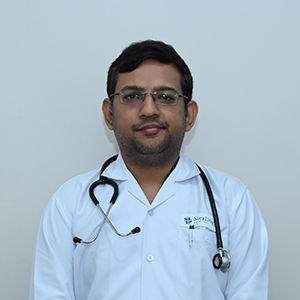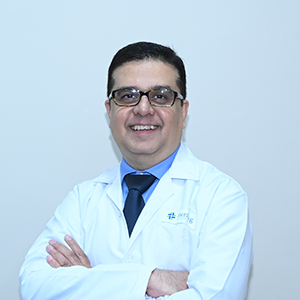Medical Oncology
The Department of Medical Oncology at Sterling Hospitals Rajkot , is a specialized department that provides comprehensive care and treatment for cancer patients. The department is equipped with state-of-the-art facilities and staffed by a team of highly trained and experienced medical oncologists, nurses, and other healthcare professionals.
Common Cancers treated
-
Breast cancer: Breast cancer is a type of cancer that forms in the cells of the breasts. It is one of the most common types of cancer in women. Symptoms of breast cancer may include a lump in the breast, changes in the breast's appearance or texture, or discharge from the nipple.
-
Lung cancer: Lung cancer is a type of cancer that starts in the lungs. It is the leading cause of cancer death worldwide. Symptoms of lung cancer may include coughing, chest pain, shortness of breath, and coughing up blood.
-
Colorectal cancer: Colorectal cancer is a type of cancer that starts in the colon or rectum. Symptoms of colorectal cancer may include changes in bowel habits, blood in the stool, abdominal pain, and unintentional weight loss.
-
Prostate cancer: Prostate cancer is a type of cancer that starts in the prostate gland. Symptoms of prostate cancer may include difficulty urinating, blood in the urine or semen, and pain in the lower back, hips, or thighs.
-
Ovarian cancer: Ovarian cancer is a type of cancer that starts in the ovaries. Symptoms of ovarian cancer may include abdominal bloating, pelvic pain, and changes in bowel or bladder habits.
-
Bladder cancer: Bladder cancer is a type of cancer that starts in the bladder. Symptoms of bladder cancer may include blood in the urine, pain during urination, and frequent urination.
-
Pancreatic cancer: Pancreatic cancer is a type of cancer that starts in the pancreas. Symptoms of pancreatic cancer may include abdominal pain, jaundice, and unintended weight loss.
-
Kidney cancer: Kidney cancer is a type of cancer that starts in the kidneys. Symptoms of kidney cancer may include blood in the urine, pain in the side or back, and unintended weight loss.
-
Leukemia: Leukemia is a type of cancer that starts in blood-forming cells. Symptoms of leukemia may include fatigue, fever, easy bruising or bleeding, and frequent infections.
-
Lymphoma: Lymphoma is a type of cancer that starts in the lymphatic system. Symptoms of lymphoma may include swollen lymph nodes, fever, night sweats, and unintended weight loss.
-
Multiple myeloma: Multiple myeloma is a type of cancer that starts in plasma cells in the bone marrow. Symptoms of multiple myeloma may include bone pain, fatigue, and unintended weight loss.
-
Sarcoma: Sarcoma is a type of cancer that starts in the connective tissues, such as bone, cartilage, or muscle. Symptoms of sarcoma may include a lump or swelling, pain, and limited movement.
The choice of treatment will depend on the type and stage of cancer, as well as the patient's overall health and preferences.
The department also offers a variety of support services, including:
-
Pain management: To help patients manage pain and discomfort.
-
Palliative care: To provide comfort and support to patients with advanced cancer.
-
Psychological counselling: To help patients cope with the emotional challenges of cancer.
The medical oncologists at Sterling Hospitals Rajkot , offers multidisciplinary cancer care by oncologists, surgeons, pathologists, and other specialists. They provide personalized treatment plans and keep up with the latest cancer research and treatment, ensuring that their patients have access to the most advanced and innovative treatments available.
The Department of Medical Oncology at Sterling Hospitals Rajkot , is committed to providing compassionate and comprehensive care to cancer patients, with the goal of achieving the best possible outcomes for each individual patient.
Common Treatments/ procedures
-
Chemotherapy: Chemotherapy uses drugs to kill cancer cells or prevent them from growing and dividing. It may be used alone or in combination with other treatments, such as surgery or radiation therapy.
-
Immunotherapy: Immunotherapy helps the body's immune system to fight cancer. It may include monoclonal antibodies, checkpoint inhibitors, or CAR T-cell therapy.
-
Targeted therapy: Targeted therapy uses drugs that target specific molecules or proteins in cancer cells to stop their growth and spread.
-
Hormone therapy: Hormone therapy is used to treat certain types of cancer that are hormone-sensitive, such as breast and prostate cancer. It blocks the effects of hormones or reduces their production to slow down the growth of cancer cells.
-
Palliative care: Palliative care is used to manage symptoms and improve the quality of life for patients with advanced cancer.
Chemotherapy
Chemotherapy is a cancer treatment that uses drugs to kill or slow down the growth of cancer cells. Here are some of the types of chemotherapy:
-
Neoadjuvant chemotherapy: This type of chemotherapy is given before surgery or radiation therapy. It is recommended when the tumor is too large to be removed surgically, or the location of the tumor makes it difficult to operate. Neoadjuvant chemotherapy drugs are used to shrink the tumor and make it easier to remove. This treatment can also help reduce the risk of cancer recurrence after surgery or radiation therapy.
-
Adjuvant chemotherapy: Adjuvant chemotherapy is given after surgery or radiation therapy. The purpose of this treatment is to kill any cancer cells that may have been left behind after surgery or radiation therapy. Even though imaging tests may show no remaining cancer cells, adjuvant chemotherapy is given as a precautionary measure to reduce the risk of cancer recurrence. Adjuvant chemotherapy can also be used to treat cancer that has spread to nearby lymph nodes or other organs.
-
Palliative chemotherapy: This type of chemotherapy is given to relieve the symptoms of cancer and improve the quality of life for patients. Palliative chemotherapy is often used for advanced cancer that cannot be cured. The aim is to control the growth of cancer cells, relieve pain and other symptoms, and improve the patient's overall well-being. This treatment can also prolong the patient's life by slowing down the progression of the cancer.
The type of chemotherapy for cancer depends on the type of cancer, stage, and overall health. The treatment plan is determined by a medical oncologist who works closely with other specialists.
Here are some common side effects of chemotherapy:
-
Hair loss: Chemotherapy drugs can cause hair loss or thinning, which may be temporary or permanent depending on the drug and dosage used.
-
Vomiting or nausea: Chemotherapy can cause nausea and vomiting, which can be managed with medications.
-
Anaemia: Chemotherapy can decrease the number of red blood cells in the body, leading to anaemia, which can cause fatigue, weakness, and shortness of breath.
-
Fatigue: Chemotherapy can cause extreme tiredness, which can make it difficult for patients to carry out daily activities.
-
Diarrhoea: Chemotherapy drugs can irritate the lining of the intestines, leading to diarrhoea.
-
Mouth sores: Chemotherapy can cause mouth sores, which can be painful and make it difficult to eat and drink.
-
Low platelet count: Chemotherapy can decrease the number of platelets in the blood, which can lead to bleeding or bruising easily.
It is important to note that not all patients will experience all of these side effects, and some may experience different or more severe side effects. Patients should discuss any side effects with their medical oncologist. \
Targeted therapy
Targeted therapy uses drugs to target specific molecules or genes that are involved in the growth and spread of cancer cells. This approach is different from traditional chemotherapy, which targets all rapidly dividing cells in the body, including healthy cells.
Types of Targeted Therapy:
-
Monoclonal antibodies: These drugs are designed to target specific proteins on the surface of cancer cells, which can stop or slow down their growth. Examples include trastuzumab, cetuximab, and bevacizumab.
-
Small molecule inhibitors: These drugs are designed to target specific molecules inside cancer cells, which can prevent the cells from growing and dividing. Examples include imatinib, gefitinib, and erlotinib.
Indications for Targeted Therapy:
Targeted therapy is used to treat a variety of cancer types, including breast cancer, lung cancer, colorectal cancer, kidney cancer, and many others. It is often used in combination with other cancer treatments, such as chemotherapy or radiation therapy.
Common Side Effects:
While targeted therapy is often well-tolerated, it can still cause side effects, which may include:
-
Skin rash: Some targeted therapy drugs can cause a rash on the skin, which may be itchy or painful.
-
Diarrhea: Targeted therapy drugs can cause diarrhea, which can be managed with medication and dietary changes.
-
Fatigue: Targeted therapy can cause fatigue, which may be temporary or long-lasting.
-
Nausea and vomiting: Some targeted therapy drugs can cause nausea and vomiting, which can be managed with medication.
-
High blood pressure: Some targeted therapy drugs can cause high blood pressure, which may require medication to manage.
It is important to note that not all patients will experience all of these side effects, and some may experience different or more severe side effects. Patients should discuss any side effects with their medical oncologist.
At Sterling Hospitals Rajkot , , medical oncologists use targeted therapy to treat various types of cancer, with a focus on providing personalized treatment plans that take into account each patient's unique needs and medical history. Patients receiving targeted therapy will be closely monitored by their medical team for side effects and will receive supportive care as needed.
Hormone therapy
Hormone therapy is a type of cancer treatment that is used to slow down or stop the growth of hormone-sensitive cancers. Hormone-sensitive cancers are cancers that are stimulated by hormones, such as breast, prostate, and ovarian cancer. Hormone therapy works by blocking the effects of hormones in the body, which can slow down or stop the growth of cancer cells.
Types of Hormone Therapy:
-
Anti-estrogens: These drugs are used to block the effects of estrogen, a hormone that stimulates the growth of breast cancer cells. Examples of anti-estrogen drugs used in breast cancer treatment include tamoxifen, fulvestrant, and aromatase inhibitors.
-
Anti-androgens: These drugs are used to block the effects of androgens, a hormone that stimulates the growth of prostate cancer cells. Examples of anti-androgen drugs used in prostate cancer treatment include bicalutamide, flutamide, and enzalutamide.
-
Luteinizing hormone-releasing hormone (LHRH) agonists: These drugs are used to block the production of hormones that stimulate the growth of prostate cancer cells. Examples of LHRH agonists used in prostate cancer treatment include leuprolide and goserelin.
Indications for Hormone Therapy:
Hormone therapy is used to treat hormone-sensitive cancers, such as breast, prostate, and ovarian cancer. It may be used in combination with other cancer treatments, such as surgery, radiation therapy, or chemotherapy, or it may be used as a stand-alone treatment.
Common Side Effects:
While hormone therapy is often well-tolerated, it can still cause side effects, which may include:
-
Hot flashes: Hormone therapy can cause hot flashes, which may be mild or severe.
-
Sexual dysfunction: Hormone therapy can cause sexual dysfunction, such as erectile dysfunction or loss of libido.
-
Fatigue: Hormone therapy can cause fatigue, which may be temporary or long-lasting.
-
Joint pain: Hormone therapy can cause joint pain, which may be mild or severe.
-
Mood changes: Hormone therapy can cause mood changes, such as depression or anxiety.
It is important to note that not all patients will experience all of these side effects, and some may experience different or more severe side effects. Patients should discuss any side effects with their medical oncologist.
At Sterling Hospitals Rajkot , , medical oncologists use hormone therapy to treat hormone-sensitive cancers, with a focus on providing personalized treatment plans that consider each patient's unique needs and medical history. Patients receiving hormone therapy will be closely monitored by their medical team for side effects and will receive supportive care as needed.
Palliative care
Cancer is a life-altering disease that can affect not just the patient but also their loved ones. Palliative care is a type of medical care that focuses on relieving the symptoms and improving the quality of life of people with serious illnesses, like cancer. Palliative care can be provided alongside curative treatment or when a cure is no longer possible.
At Sterling Hospitals Rajkot , , we believe that palliative care is an essential part of cancer care. We have a dedicated team of healthcare professionals who specialize in providing palliative care to our patients. Our team includes doctors, nurses, social workers, and other healthcare professionals who work together to address the physical, emotional, and social needs of our patients.
One of the key goals of palliative care is to manage the symptoms associated with cancer and cancer treatment. Symptoms like pain, nausea, vomiting, and fatigue can have a significant impact on a patient's quality of life. Our palliative care team works closely with the patient and their family to develop a personalized care plan that addresses their specific symptoms and needs.
In addition to symptom management, palliative care also provides emotional and social support to patients and their families. Our team can help patients cope with the emotional challenges of cancer, such as anxiety, depression, and fear. We can also help patients and their families navigate the healthcare system and make decisions about care.
In addition to symptom management, our palliative care team also provides emotional and psychological support to our patients and their families. A cancer diagnosis can be overwhelming, and patients and their families may experience a range of emotions, including fear, anxiety, and depression. Our team is available to provide counselling and support to help patients and their families cope with these emotions.
At Sterling Hospitals Rajkot , , we understand that each patient's journey is unique, and we provide individualized care that is tailored to their specific needs. Our team works closely with the patient and their family to ensure that their preferences and goals are taken into consideration when developing their care plan.
We also recognize that palliative care is not just for patients who have advanced cancer. Patients who are undergoing cancer treatment may also benefit from palliative care to manage the side effects of their treatment and improve their quality of life.
Palliative care is not limited to medical care alone; it also includes spiritual and cultural support. Our team is sensitive to the cultural and religious needs of our patients and their families and provides support that is appropriate for their individual needs.
Finally, we understand that the needs of our patients and their families extend beyond medical care, and we provide support for practical issues such as financial concerns, transportation, and access to community resources.
In conclusion, at Sterling Hospitals Rajkot , , we believe that palliative care is an essential component of cancer care. Our team of healthcare professionals is dedicated to providing compassionate care that addresses the physical, emotional, and social needs of our patients and their families. If you or a loved one is facing a cancer diagnosis, we are here to provide the support and care you need.












